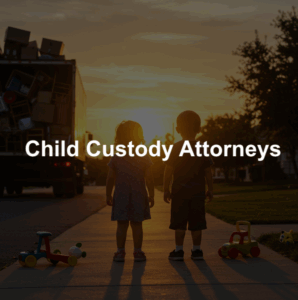Award Winning Child Custody Attorneys in Riverside, CA
 There are a number of people who might have an interest in the well-being of a child. Parents, family members, and friends often become concerned when a child is being mistreated or is not being well cared for, according to what they see. Many want to take action as a way to help the family or child. Some try to accomplish this by filing a custody action in California courts. However, not everyone will have the legal ability to do so.
There are a number of people who might have an interest in the well-being of a child. Parents, family members, and friends often become concerned when a child is being mistreated or is not being well cared for, according to what they see. Many want to take action as a way to help the family or child. Some try to accomplish this by filing a custody action in California courts. However, not everyone will have the legal ability to do so.
Knez Law Group is comprised of highly knowledgeable and skilled child custody lawyers serving Riverside County and the Inland Empire.In California child custody cases, a person seeking some form of custody of a child must have legal standing to file a case. Standing is the legal right to bring an action because the law finds that you have a sufficient connection or interest in a case. While custody is common in divorce cases, their are other types of cases that handle custody that are still under family law.
Knez Law Group, LLP is located at 3890 Tenth St Riverside, CA 92501 and is located near Market St & Tenth St just a half mile away from the Mission Inn (open in Google Maps). We’re highly experienced in all legal matters impacting a family and can help you in the stressful time. If you need to speak to a child custody lawyer ASAP, contact us today or call us at (951) 742-7681.
Recent Review:
“Andrew Knez is a great attorney. He was patient and understanding of all the issues of my family law case. He got me from supervised visitation and zero custody to sole physical custody.”
Google Verified Review from Mitchel Q.
Relentless Advocates for the Injured
At Knez Law Group, we bring decades of combined experience helping families throughout California. From divorce to the most complex child custody arrangements, we’ve helped clients secure their family needs. Recognized with top ratings on Google and Yelp and honors from Martindale-Hubbell and Avvo, we are known for our integrity, advocacy, and results. We are committed to justice—every client, every case.
Types of Custody in California Family Law Courts
In California, there are many different types of standing in custody cases. A few of the methods individuals typically used to obtain legal standing include standing as a parent, guardianship, and standing of a non-parent using in loco parentis status, which means in place of a parent.
If you or someone you know is interested in filing a custody petition or already involved in custody proceedings including a divorce, Knez Law Group has significant experience working with clients involved in divorce, father’s rights, custody & visitation cases.
Call (951) 742-7681 to schedule a consultation with an experienced Riverside child custody lawyer today. We will schedule you to discuss your matter with an attorney directly.
Custody Considerations in California
Generally, there are two types of custody that a court will award as follows:
- Legal custody involves the right to be a part of the decision-making of a child’s health, safety and welfare. Some of the typical decisions that a person with legal custody must make include healthcare, education, extracurricular activities, and more. Courts may grant legal custody to one or both parties. Sole legal custody occurs when the court provides one parent with the legal authority to make decisions regarding the child’s health, safety and welfare. Shared or joint legal custody involves the court granting legal custody to both parents in a case. In these circumstances both parents have an equal right to make decisions about the child and must petition the court if a dispute arises and the parties cannot agree. Where there is an order of joint legal custody and a parent fails to share in the decision-making process, such may be grounds to change custody from joint to sole legal custody.
- Physical custody is the court’s power to grant one or both parties the right to spend time with the children. Depending on the child’s age and location in relation to the parents, and the conduct of the parents, the court may grant primary physical custody to one parent while the other has visitation, or the court may grant shared or joint physical custody where both parents spend an equal amount of custody time with a child. The courts do not favor sole or joint custody over the other, rather they look to the best interest of the child in the given set of circumstances.
Modifications of Child Custody
 In many cases, there are changes that occur that result in the need to modify a custody order or agreement. If the parties cannot agree on the changes that must be made, the parties must petition the court for a ruling. Depending on whether there is a final or permanent order, the court will require the party seeking to change or modify custody to show a substantial change of circumstances.
In many cases, there are changes that occur that result in the need to modify a custody order or agreement. If the parties cannot agree on the changes that must be made, the parties must petition the court for a ruling. Depending on whether there is a final or permanent order, the court will require the party seeking to change or modify custody to show a substantial change of circumstances.
However, under some circumstances, the party seeking to change or modify custody only needs to show that it is in the best interest of the child to change custody.
The court will look at a number of custody factors to determine how an order must be changed to serve the best interests of a child, including the health, safety and welfare of the child, any history of abuse, the relationship of the child to the parents, the ability of the parent to co-parent, the nature and amount of contact the parent has with the child, and any substance abuse.
Parent Relocation (“Move-Away” Cases)
Sometimes, parents wish to move to another county, city, state or country. A parent has a constitutional right to relocate, however that does not mean a parent has a right to relocate a child without the consent of the other parent. When a parent decides to move, he or she must think about all of the implications that a move can have, especially on a current custody order.
In California, parents must obtain the court’s permission prior to relocating if they are planning to take any children with them. Move-away cases can become very complex as there are a number of factors the court will consider to determine what is in the best interest of the child and whether a move will cause detriment to the child. The Knez Law Group has worked with both the non-relocating parent and the relocating parent to preserve custody and/or visitation rights when a move-away is involved.
Contact Our Child Custody Lawyers – Serving the Inland Empire, Los Angeles and Orange County
Child custody & visitation proceedings have an impact on the entire family. To protect & apply your legal rights contact Knez Law Group today at (951) 742-7681. We can get started today to help you protect your physical or legal custody rights.

